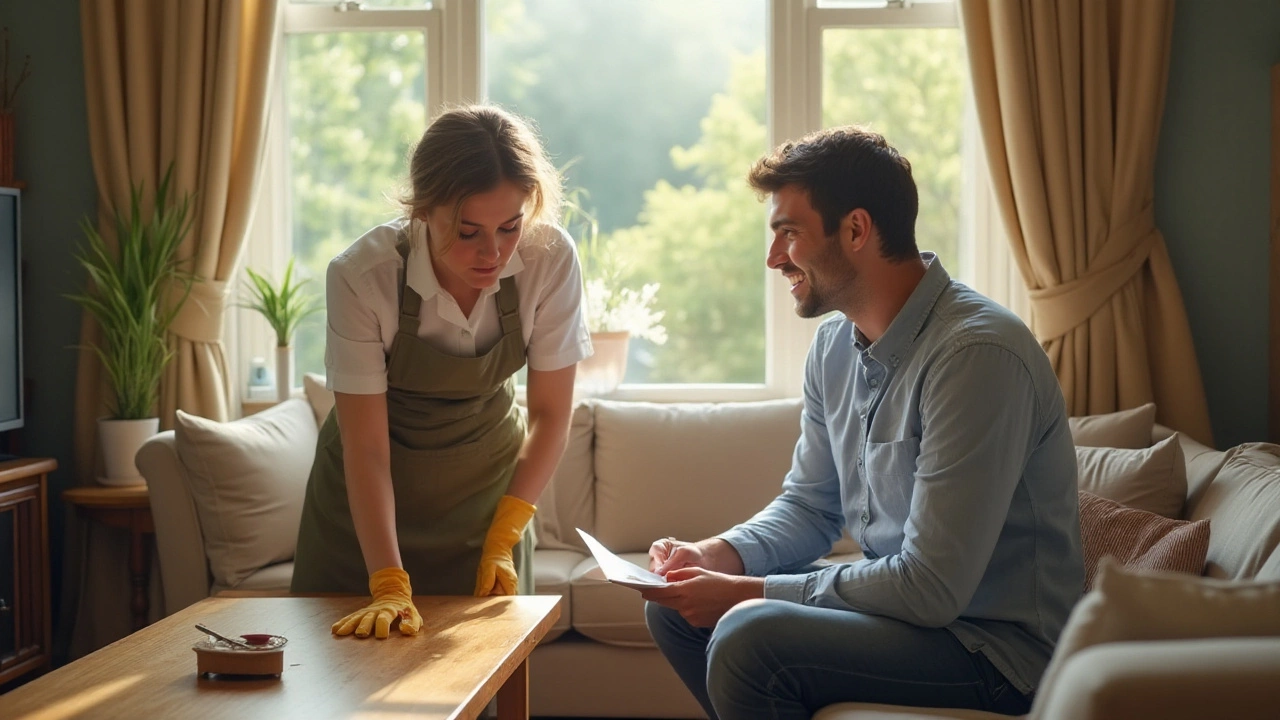Engaging with cleaning professionals when moving out of a rental property comes with its set of unique questions and protocols. Understanding what's expected from both parties can help in avoiding potential misunderstandings and ensuring that the cleaning process goes as smoothly as possible.
Whether you're hiring a cleaning lady to help with an end of tenancy clean or simply bringing someone in for regular upkeep, knowing the etiquette can make a significant difference. From setting clear expectations about job specifics to navigating the often-tricky topic of payment and tips, there's a lot more to this professional interaction than meets the eye.
In the paragraphs that follow, let's dig into the essentials of the etiquette surrounding this frequently overlooked area and discover how to ensure your experience is as seamless and mutually beneficial as possible.
- Understanding the Role
- Setting Clear Expectations
- Communication Do's and Don'ts
- Addressing Payment and Gratuities
- Common Misunderstandings
Understanding the Role
When embarking on the journey of hiring a cleaning lady for end of tenancy cleaning, one of the most crucial steps is to fully grasp the duties and responsibilities involved. The cleaning lady isn't just there to tidy up; she plays a significant part in the move-out process. Her role is to ensure that the property is returned to the landlord in top-notch condition. This often involves more than just surface cleaning. Thorough cleaning of kitchens, bathrooms, floors, and even the nooks and crannies should be expected. The importance of this is underlined by a study which shows that properties left in pristine condition result in fewer deposit disputes by nearly 25%.
Many tenants mistakenly assume that all cleaning professionals will automatically know what's required for an end of tenancy clean, but it's essential to clearly communicate the specifics. For instance, does the oven need degreasing? Are there blinds and curtains that need dusting? By clearly outlining the tasks at hand, tenants set both parties on the path to a successful and stress-free experience. Cleaners appreciate this transparency and, in turn, can provide valuable insights into what might need special attention.
Interestingly, cleaning professionals often come equipped with their own tools and supplies, yet it’s not odd to confirm this detail. It's important to discuss whether the cleaning lady prefers using certain products, especially if there are preferences for eco-friendly options. Using these kinds of products not only helps the environment but has been linked to fewer allergic reactions according to a recent opinion poll of cleaning professionals.
"A successful cleaning experience hinges on clear communication between tenants and cleaning professionals," says Jane Smith, a professional cleaner with over twenty years of experience in tenancy cleaning.
Aside from the physical act of cleaning, there's an emotional aspect too. Many cleaning professionals pride themselves on their work and take satisfaction in leaving a space better than they found it. Recognizing this commitment isn't just polite; it's a handy way to motivate and build rapport. It's worth noting that preemptive appreciation can cultivate a professional yet friendly atmosphere, making the process feel less transactional and more like a collaborative effort.
From understanding what constitutes a thorough clean to the materials involved, and the intrinsic satisfaction of a job well done, recognizing the role of a cleaning lady offers a concrete foundation for both tenant and cleaning professional. This foundation is vital for the final step in the move-out process, ensuring a seamless handover and better peace of mind. Keeping these elements in mind can significantly boost the chances of a positive outcome for everyone involved.
Setting Clear Expectations
One of the most critical aspects when hiring a cleaning lady for end of tenancy is to set clear expectations. This not only helps ensure that the job is done to your satisfaction but also respects the professional’s time and expertise. To start with, it's important to discuss the precise areas and items you want cleaned. This encompasses everything from the living room carpet to the kitchen appliances. Knowing exactly what needs attention prevents any oversight and avoids last minute changes.
Communicating these needs requires a certain degree of clarity. You may consider making a checklist of tasks that need doing. This checklist can function as an agreement, ensuring both parties are clear on the tasks involved. For instance, if deep cleaning the oven is a priority, it should be clearly stated in advance. A well-organized plan can instill a sense of professionalism in your dealings and can also save you from any potential disappointments later.
It's equally vital to discuss timing. Moving out can be chaotic, and setting realistic timelines can help manage stress for you and the cleaner. Give ample time for cleaning, especially if the property is large or heavily furnished. Understanding the time commitment not only shows respect for the cleaning professional’s schedule but also ensures a thorough job. A good practice is to ask the cleaner about their estimate on how long each task might take.
Moreover, aligning on specific cleaning products is also a valuable part of expectation setting. Many cleaning ladies bring their own supplies, which may include eco-friendly or hypoallergenic products. If you have preferences, such as avoiding allergens or using organic cleaners, make sure these are communicated ahead of time. Don't hesitate to express if there are any chemicals you want or do not want used in your home.
"The ability to articulate expectations clearly can significantly improve the interactions and outcomes you have with service professionals," says Julia Barnes, a renowned etiquette coach.
Finally, it's vital to be transparent about payment. Discussing rates upfront can remove the awkwardness later. Whether the service charges by the hour or per task should be settled before the cleaning begins. Additionally, if the cleaning involves unexpected tasks, it's fair to consider discussing extra compensation. Just like any service, acknowledging and rewarding a job well done not only builds rapport but also ensures the cleaner feels valued and appreciated.
A thoughtful approach, where both parties understand and agree on what needs to be done, can set a positive tone for the entire cleaning process, leading to satisfactory outcomes that leave both the tenant and the cleaning lady happy with the experience.

Communication Do's and Don'ts
Communication is the cornerstone of any professional relationship, and it is no different when you hire a cleaning lady for your home. It's crucial to maintain clear and open dialogues to avoid the pitfalls of assumption and misunderstanding. Perhaps the first commandment of hiring help is to outline your expectations right from the get-go. Before booking an end of tenancy cleaning service, take the time to walk through your home if possible and specify the scope of work. Discuss which areas need extra attention and which spots might require special products or techniques. Clear communication ensures that both parties are on the same page about what 'clean' will look like by the end of the appointment.
While being explicit in outlining your needs is essential, it's equally important not to micromanage. Trust the expertise of the professionals you've hired. Experienced cleaners often have their methods for being efficient and thorough. Hovering over them or critiquing their every move is not only unproductive but can also create a tense atmosphere. The key is to foster a sense of collaboration. Offer suggestions but allow room for the cleaner to implement their proven practices. Politeness is of paramount importance—courtesy goes a long way. Remember, it's not just about completing a task; it's about building a respectful relationship.
An area of communication often overlooked is feedback. Leaving constructive feedback post-service can be helpful. If certain elements of the job weren't to your liking, communicating it respectfully paves the way for improvement and prevents future misunderstandings. Alternatively, if the service exceeded your expectations, a note of appreciation can be quite motivating. A positive client-cleaner relationship is mutually beneficial.
"Good communication is just as stimulating as black coffee, and just as hard to sleep after," said Anne Morrow Lindbergh, highlighting the vitality of effective communication in any context.Additionally, a small token of appreciation can be the difference between a formal transaction and a positive, ongoing relationship.
The logistics of communication matter. When confirming appointments, make sure to use clear language and avoid industry-specific jargon that might confuse. Making assumptions that the professional will automatically know your particular needs can lead to unsatisfactory service. The cleaner's job becomes that much easier and more efficient with every additional bit of relevant information you can provide—right from the dimensions of the home to specific instructions on where to park. Regularly check in on the progress without being intrusive. If you're unavailable during the cleaning, be sure your contact information is correct and reachable, should questions arise during the service.
Lastly, navigating cultural nuances is also part of the job. Many cleaners come from diverse backgrounds, and understanding or at least acknowledging cultural differences can enrich the interaction. These differences may extend to preferences in communication style, punctuality, or approach to cleaning tasks themselves. It's a small world, and in an interconnected place like Bristol, being culturally aware can help you communicate better and build a rapport that's enriching for both you and your cleaning professional. Ultimately, the seamless communication between you and your cleaning lady ensures that your move-out is stress-free and leaves the space in the best possible condition for its next tenants.
Addressing Payment and Gratuities
Payment and gratuities can often become a delicate part of hiring a cleaning lady, yet they are critical in ensuring that the service relationship runs smoothly. A fundamental aspect of showing respect and appreciation for a job well done, knowing how much to pay and whether to tip can prevent awkwardness on both ends. Typically, the cost of tenancy cleaning is contingent on factors like the size of the property and the extent of cleaning required. While hourly rates provide a sense of transparency, a fixed rate is often agreed upon beforehand for end-of-tenancy jobs, especially in larger cities where demand fluctuates.
Understanding the right rate contributes to fair compensation. For instance, in the UK, average figures suggest that pricing may range anywhere from £12 to £20 per hour for regular cleaning tasks. Yet, keep in mind that end of tenancy jobs, due to their comprehensive nature, can command a higher price tag. It's not uncommon for larger jobs to approach figures of £150 to £200, particularly when thorough operations like steam cleaning are involved.
As noted by The Spruce, "Tipping house cleaners is not expected, but is always appreciated, especially as they work hard to make your home comfortable and sparkling."
When it comes to gratuities, the waters can get a bit murky. Tipping is not always customary, but offering an extra token of gratitude helps express appreciation. A usual tip might range between 10% to 15% of the total bill, yet it hinges substantially on the service quality and personal satisfaction. On special occasions, such as before the Christmas season or after particularly challenging work, tipping can be a way of expressing genuine thanks. Consider this: some folks prefer gifting instead, offering chocolates or a small token, which can be equally heartwarming.
Of course, payment is not solely monetary. An equally priceless factor is acknowledging the hard work with gratitude and respect. A sincere "thank you" goes a long way in fostering goodwill. It's not only about maintaining a professional relationship; it's about cultivating a sense of mutual respect and recognition. Should you employ the same cleaning lady regularly, establishing this rapport can ensure your home is always in safe and capable hands, building a level of care and trust that can enhance service quality. Cleaning tips, such as these, can often boil down to simple human kindness.

Common Misunderstandings
When it comes to engaging a cleaning lady for tenancy cleaning, misconceptions abound on both sides of the arrangement, sometimes leading to frustration or dissatisfaction. One common misunderstanding is about the extent of the cleaning tasks expected. Tenants might assume that a standard service includes everything from carpet shampooing to wall cleaning, while cleaners may expect otherwise. It's crucial to communicate these expectations clearly at the outset to avoid disappointment. A tenant, for instance, might envisage their cleaner scrubbing beyond regular touchpoints whereas the cleaner halts at clean just the essentials like floors and regular surfaces unless specified otherwise.
Likewise, the topic of providing supplies can also be a murky territory. Some tenants expect the cleaning service to bring all necessary equipment and products, while many professionals anticipate utilizing the materials provided at the location. Discussing this detail beforehand avoids any awkward situations where cleaning can't proceed as planned due to missing supplies. Similarly, misunderstandings often arise regarding the estimated time to complete tasks. Tenants might underestimate the time needed for a thorough job, compelling some to rush through tasks, which could lead to unwelcome delays in the moving process. Tenancy cleaning is not a one-size-fits-all service, and the time taken varies depending on the size of the property and its condition.
In an insightful remark from The Clean Institute on professional cleaning standards:
"The key to a successful cleaning transaction lies in the intersection of clear communication and mutual understanding of the cleaning scope."Another area prone to misunderstandings is the discussion of payment terms and gratuities. Questions about whether tipping is obligatory or what constitutes a fair rate for extended services can create uncertainty. It's often recommended to consult any service agreements or industry standards in your area, allowing tenants and cleaners to navigate the payment landscape with more clarity. Lastly, misunderstandings occur around recognizing the completion of a job. Tenants can have diverse expectations about what constitutes a 'move-out ready' state compared to what the cleaner may perceive.
To further illustrate, consider a scenario where a tenant believes a cleaning service should include appliance maintenance, such as oven or refrigerator cleaning. However, many professional cleaners regard these as add-ons requiring explicit requests. These small discrepancies can lead to tension, especially if tenants expect to get their deposit back without addressing them. Establishing an open line of communication early and ascertaining all required tasks ensures a smoother process, beneficial to both parties involved. The data below reveals a statistical perspective on common points of disagreement during cleanings:
| Misunderstanding | Percentage of Occurrence |
|---|---|
| Extent of Cleaning Tasks | 40% |
| Supply Responsibility | 25% |
| Payment and Tipping | 20% |
| Time Estimation | 15% |
